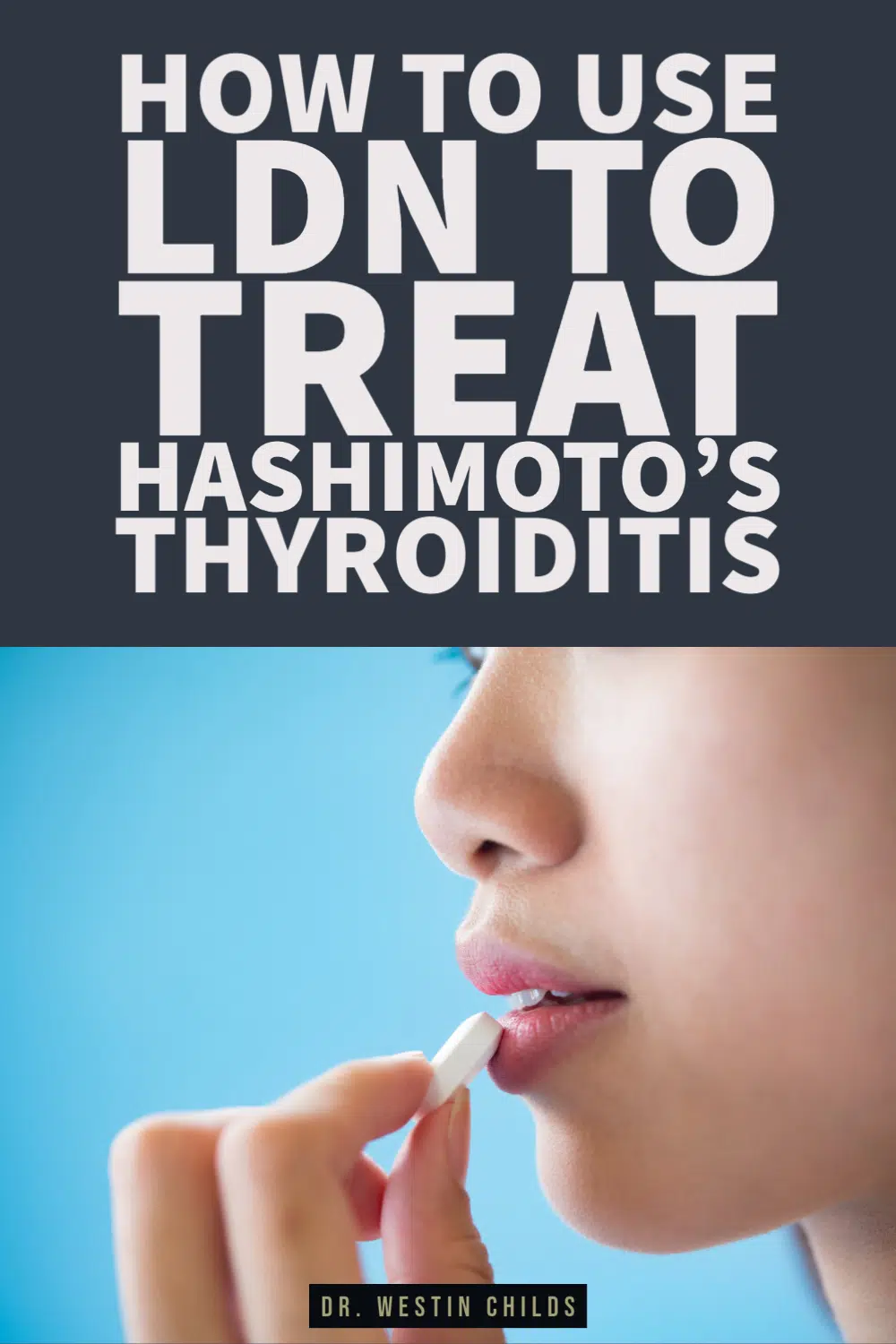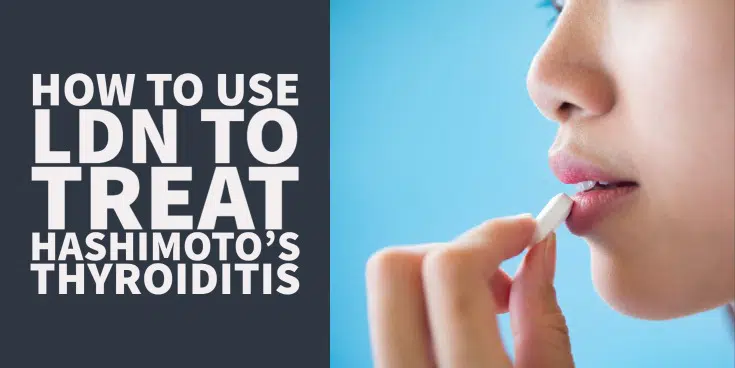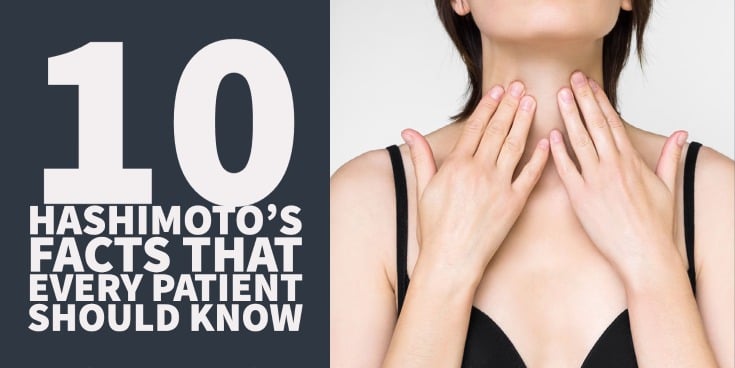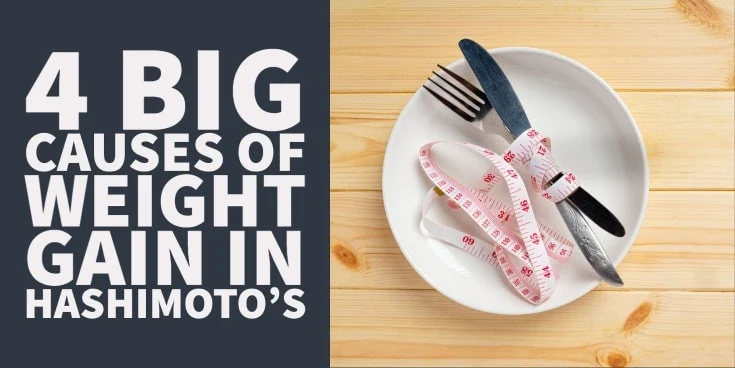There are very few medications that you can use to treat Hashimoto’s thyroiditis and LDN is one of those medicines.
But how does it work? Will it work for you? Is it safe to use? And, if so, how should you dose it?
We are going to explore all of these questions and more.
I’ve been using LDN for several years with great success and the goal of this article is to share what I’ve learned through the years so that you can determine if LDN is worth using in your situation.
LDN 101
If you aren’t familiar with LDN let me fill you in really quickly.
LDN is a prescription medication that stands for low-dose naltrexone.
It’s a prescription medication that is often used off-label to treat the autoimmune disease Hashimoto’s thyroiditis.
LDN probably works by stimulating the release of endorphins which then impact your immune system and help to balance or regulate autoimmune activity.
It also seems to have positive effects on other hormone systems such as insulin and can also help reduce inflammation.
The exact mechanism of action is actually not well understood, so we are not going to focus on it for this discussion.
The important thing to know here is that LDN is one of the only prescription medications that can be used to treat Hashimoto’s.
It would be one thing if LDN was one of many potential options that Hashimoto’s patients have at their disposal but this isn’t true.
At the time of this writing, there are zero FDA-approved medications for Hashimoto’s thyroiditis which means the standard of care (standard treatment option) is to wait and see.
The wait-and-see approach (1) involves waiting until your own body destroys a sufficient amount of your thyroid gland that you then require taking thyroid medication.

LDN serves an important purpose:
To try and reduce the autoimmune destruction on your thyroid gland, to help reduce systemic inflammation (2), to help re-educate your immune system (3), and to help naturally improve thyroid function in your body.
And, while it is becoming more and more accepted that LDN can potentially help with these things, there are very few clinical studies (if any) that show that LDN is effective specifically for Hashimoto’s thyroiditis.
There are, however, other studies that show that it can be effective in treating OTHER autoimmune diseases such as Crohn’s disease (4).
Drawing from this evidence, it’s plausible that LDN can ALSO help with Hashimoto’s, even if no such studies exist that prove this claim.
Indeed, my clinical experience (I’ve used LDN for many years on many patients) suggests that it can be effective for thyroid patients and for those with Hashimoto’s.
With this in mind, let’s talk more about the specifics of using this medicine.
DOWNLOAD FREE RESOURCES
Foods to Avoid if you Have Thyroid Problems:
I’ve found that these 10 foods cause the most problems for thyroid patients. Learn which foods you should avoid if you have thyroid disease of any type.
The Complete List of Thyroid Lab tests:
The list includes optimal ranges, normal ranges, and the complete list of tests you need to diagnose and manage thyroid disease correctly!
Will LDN Help Reduce Thyroid Antibodies?
Because Hashimoto’s is an autoimmune disease and because it is felt that the antibodies in these types of diseases do damage to the body, people often pay very close attention to their absolute antibody level.
What they don’t always appreciate, though, is that the severity of autoimmune disease (especially for Hashimoto’s) doesn’t always correlate with these antibody levels.
Does that mean that you should ignore your antibody levels?
No, but it does mean that you shouldn’t judge whether or not LDN is working based on these levels.
If you are new to Hashimoto’s, the antibodies we are talking about are called TPO antibodies (thyroid peroxidase antibodies) and TgAB (thyroglobulin antibodies) and these are the antibodies that your immune system creates that cause issues for your thyroid.
Both of these antibody levels can be measured in the serum and tracked and the presence of these antibodies (if also combined with abnormal thyroid lab tests or hypothyroid symptoms) can help make the diagnosis of Hashimoto’s thyroiditis.
The point I am trying to make here is this:
It’s possible for you to use LDN and for it to be effective without it also lowering your antibody levels.
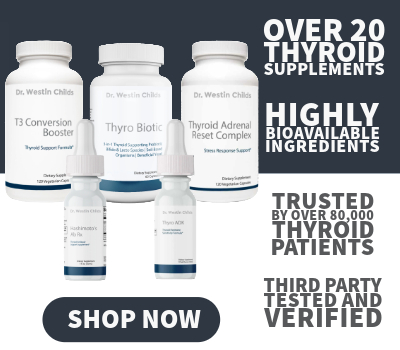
I still think it’s a good idea for you to continually check your antibodies as a way to monitor your lab tests and your progress, but don’t use your antibodies as a metric as to whether or not the medication is working.
You may find that as you take LDN your antibody levels decrease and you feel markedly better.
Some people may find, however, that their antibody levels stay the same or increase, and yet their symptoms have improved dramatically.
The medication is probably still working in both scenarios but through different mechanisms.
How to Dose LDN
LDN is called low-dose naltrexone for a reason and that reason has to do with how it is dosed.
The “standard” doses for Naltrexone are typically as high as 50mg per day.
In addition, the standard tablets come in 50mg doses (5).
But when we are talking about LDN we are talking about much lower doses than this.
Typical doses for LDN range from 1.5mg to 4.5mg per day which is about 11 to 33 times lower than these standard doses.
Because of this, you will most likely need to get your LDN compounded from a compounding pharmacy.
It’s possible to use the standard 50mg tablets, but it’s not easy to try and break those tablets up to the small doses that are necessary.
There are many ways to dose LDN, but I will give you what I think works bests:
- Start with 1.5mg per day for 15 to 30 days
- After 15-30 days increase up to 3.0mg only if you are not experiencing negative side effects and if you have not noticed a positive improvement
- After another 15-30 days (depending on sensitivity), increase up to 4.5mg per day (but only if you are not experiencing any negative side effects or the desired positive outcome)
This slow titration schedule allows you to slowly increase your dose over a period of time while reducing the chance of negative side effects.
*Note: there are many other ways to dose LDN and I am just sharing what I believe is the most effective based on my own experience. You might, however, find that some doctors start you right away at 4.5mg or accelerate the titration schedule.
Side Effects of LDN
Like any medication, LDN can have both positive and negative side effects.
I find that most people who use LDN experience either positive side effects (the things you want to happen) or simply no reaction at all (which is better than having a negative reaction).
Having said that, though, there are some people who do experience side effects which would be considered ‘negative’ even though they are typically rare.
The most common side effect that I see is insomnia, which can be solved by changing the time of day that you take the medication.
Some people also experience changes in their dreams (especially if they take it at night). For the most part, these are not necessarily negative but they can be.
Rarely, do I also see some people suffer from nausea and headaches (but these are quite uncommon).
Further potential side effects of LDN (both good and bad) include:
- Improved sleep
- Insomnia (it can either help or harm your sleep)
- Weight loss
- Reduction in inflammation
- Reduced joint pain (6)
- Improved blood sugar
- Nausea
- Headaches
- Vivid dreams
Compared to most medications, this list is actually quite mild.
Don’t let the potential side effects of using LDN stop you because most people do very well when taking it.
Studies also confirm that this medication is quite safe and well-tolerated (7).
What to Expect When Using LDN
Will using LDN be a slam dunk for you and your Hashimoto’s?
The answer is maybe, but you shouldn’t walk into therapy expecting this medication to be a miracle drug or something that will completely turn around your disease state.
While it is true that this sometimes happens, it’s been my experience that this type of response is actually quite rare.
Perhaps 2-5% of people who use LDN will see a vast improvement in their symptoms over a short period of time.
Then there is another 40-60% or so who will see definite improvement but this improvement will be gradual and appear slowly over a several-month period.
Then there is another large group, perhaps close to 40%, who will not experience any noticeable improvement in their symptoms at all.
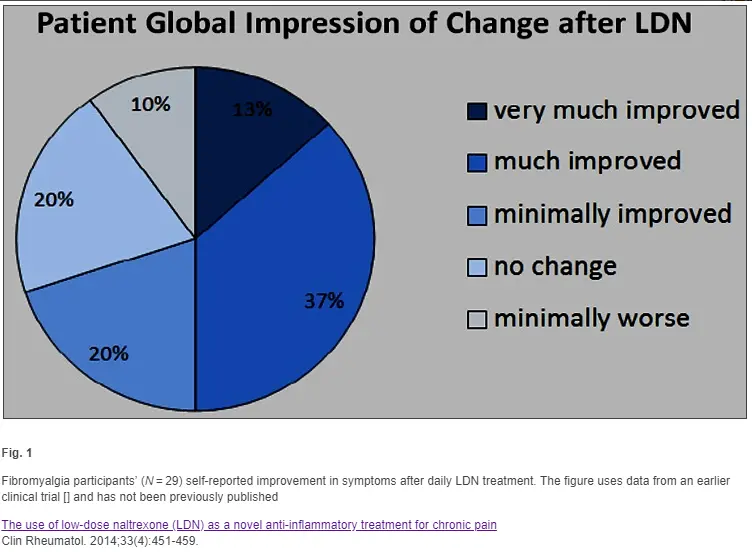
(Image: this image is from a small study done on patients with fibromyalgia and not Hashimoto’s so the percentages do not reflect what I see in my own clinical practice)
This group of people, for whatever reason, may not be responding to the LDN at all.
If you fit into this category then it may be worth it to adjust your dosing and the time of day that you take the medication.
These small steps might actually make a big difference and should be explored before you discontinue it altogether.
There is also another group of people (percentage unknown but perhaps close to 20%) who do not believe LDN is working in their bodies but notice an abrupt worsening in their symptoms once they stop taking the medication.
Consider this as a warning before you discontinue using LDN.
How to Get LDN
While there are PLENTY of benefits to using LDN, it can actually be somewhat hard to get, but certainly not impossible.
So, how do you get it?
In order to obtain LDN, you MUST get a valid prescription from a doctor.
But, because LDN is not FDA-approved for treating Hashimoto’s, it can actually be somewhat difficult to get from regular doctors.
Doctors including endocrinologists, family practice doctors, and other conventionally trained physicians are often not too keen on writing a prescription for you, even when faced with evidence in the form of clinical studies.
If you work with your doctor and bring in the clinical studies that show that this medication can be effective, then you run a higher chance of getting a prescription.
Remember, though:
Do not argue with your doctor or become angry or frustrated. This response will almost always result in even more pushback from your current doctor.
If you can’t find a conventionally trained doctor who will prescribe it for you then you may have to look into alternative or integrative doctors.
These doctors are much more open to using medications such as LDN.
You can find them by searching for doctors who specialize in integrative medicine, functional medicine, and anti-aging medicine.
You might also find success using Naturopaths but only if they can prescribe in your state (I believe there are about 22+ states that allow them to prescribe medications (8) at this time but feel free to correct me and provide more accurate info in the comment section).
I have a list of tips and tricks that can help you find a doctor to help with your thyroid here.
Other Uses for LDN
LDN is also one of my personal favorite medications to use for those with thyroid disease because of its effects on metabolism and weight management.
I find that the majority of hypothyroid patients, which includes those with Hashimoto’s, also seem to have trouble losing weight and keeping it off.
This makes LDN the perfect combination medication for patients who struggle with both problems.
In fact, I find myself using LDN more for weight management than I do for the autoimmune component of Hashimoto’s thyroiditis.
Regardless of the primary purpose you are using it for, just realize that LDN may have other benefits for your body.
How does LDN help with weight loss?
It’s actually not clear, but it’s probably mediated through a combination of its impact on your hypothalamus (the metabolism control center) and its impact on certain fat hormones such as insulin (and perhaps leptin).
And, what might surprise you further, is that most doctors should know that it does this!
Why?
Because Naltrexone (which is another name for LDN) is one of the two active drugs in a medication known as Contrave (9).
And this medication is FDA-approved for weight loss!
This is important because LDN is not an FDA-approved therapy for treating Hashimoto’s (remember, no such treatment or medication exists for that purpose) which means if you use it for this purpose you are using it off-label.
But using Naltrexone for weight loss is considered FDA-approved (provided it’s used in combination with Wellbutrin which is the other drug in Contrave).
The dosing of LDN for weight loss and for Hashimoto’s do differ, however, so keep that in mind.
You may not notice the weight loss effects at the smaller doses of LDN which are typically used for treating autoimmune diseases.
But be cautious about increasing your dose too high which can also have negative consequences.
Conclusion
LDN is a great medication that can potentially help some people who suffer from Hashimoto’s thyroiditis.
While it isn’t FDA-approved for this purpose, there have been some studies that show that it can help mediate the immune system and help reduce inflammation.
It’s plausible that these effects may also have an influence on autoimmune thyroiditis.
My personal experience suggests that Hashimoto’s can be beneficial for approximately 60% of Hashimoto’s patients who may experience some degree of improvement while using it.
If you decide to use it, be sure to watch for side effects and keep an eye on your thyroid lab tests (both your antibodies and thyroid function tests) as they both may fluctuate.
Now I want to hear from you:
Are you using LDN for your Hashimoto’s?
Do you notice an improvement in your symptoms?
How long have you been taking it?
If you are taking it, how did you get your doctor to prescribe it?
Leave your questions or comments below!
Scientific References
#1. https://www.ncbi.nlm.nih.gov/books/NBK285557/
#2. https://www.ncbi.nlm.nih.gov/pmc/articles/PMC3962576/
#3. https://www.ncbi.nlm.nih.gov/pubmed/29885638
#4. https://www.ncbi.nlm.nih.gov/pubmed/24558033
#5. https://www.mayoclinic.org/drugs-supplements/naltrexone-oral-route/proper-use/drg-20068408
#6. https://www.ncbi.nlm.nih.gov/pubmed/24526250
#7. https://www.ncbi.nlm.nih.gov/pubmed/29377216
#8. https://aanmc.org/resources/licensure/
#9. https://contrave.com/how-contrave-works/
